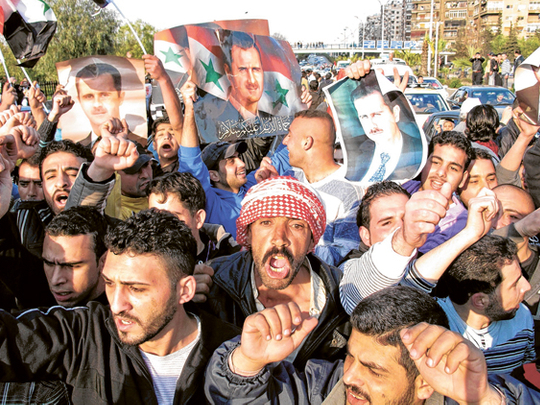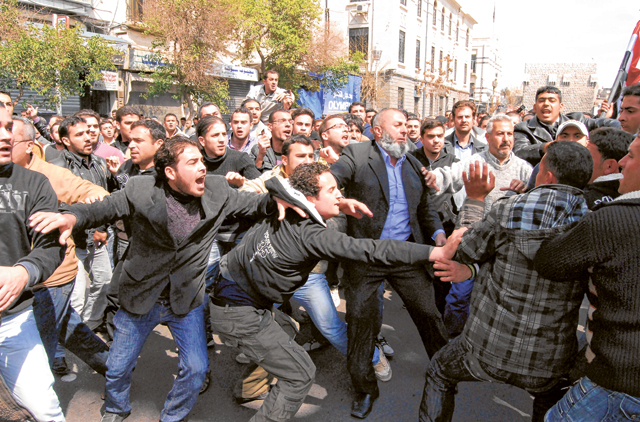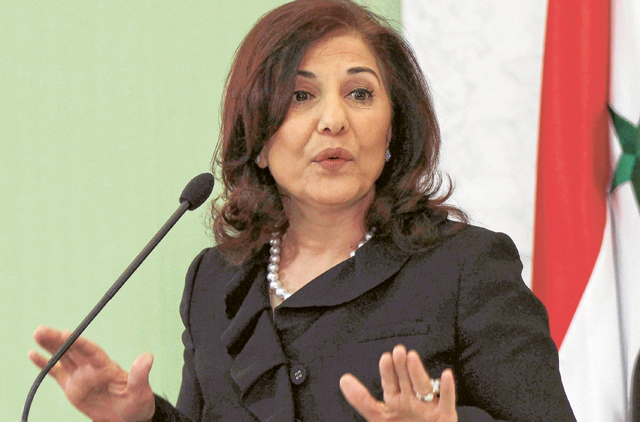
Damascus: Syrian President Bashar Al Assad was facing the most serious unrest of his 11-year tenure as anti-government protests in a southwestern city threatened to escalate after a deadly crackdown.
Having watched dissent convulse the region, the Syrian state has been taking no chances. Even buying a can of spray paint is seen as a potentially subversive act, requiring an ID card that is registered with the government.
Daraa, near the Jordanian border, became the centre of the so-far-localised dissent after 15 children were arrested there this month for spray-painting walls with words that have rattled the Arab world: "The people want the fall of the regime."
On Wednesday, security forces launched a pre-dawn raid in the city in which dozens of people were killed, according to witnesses and activists. Estimates of the death toll range from 15 to 51.
On Thursday, witnesses said, thousands of people gathered in the city to bury the dead, chanting, "Syria! Freedom!" The killings have prompted calls for larger anti-government demonstrations, testing both Al Assad's determination to quell the spirit of revolt by any means necessary and the will of Syrians fearful of chaos and civil war. Authorities in the capital, Damascus, are also trying softer measures to contain the unrest.
Children released
They have released the detained children and referred to some of those killed by Syrian security forces as "martyrs". At a news conference on Thursday, Buthaina Shaaban, an adviser to Al Assad, announced a package of reforms that included opening up the media, allowing political parties and looking into lifting an emergency law in place since 1963.
State-run Syrian TV also announced that Al Assad had ordered the release of those detained in southern Syria in connection with the protests there. At least 92 people were detained in just the past week, according to the Syrian Human Rights League. Many others are in hiding.
But some observers say Al Assad — a 45-year-old, Western-educated doctor, who many Syrians still hope will deliver promised changes — will ultimately have to choose: either use the historically brutal practices of Syria's efficiently repressive security forces or implement serious reforms.
"Every Syrian is frightened, and they don't want to be Iraq. That's the cautionary tale — and the government has raised the banner of security and stability for the last 40 years," said Joshua Landis, a Syria expert and director of the Centre for Middle East Studies at the University of Oklahoma.
"They're hesitating, but it seems like there is a big hole in the dike here, and the fear factor is collapsing. The latest videos streaming out are horrifying; they're very gruesome."
The people will either react to the violence perpetrated by security forces in Daraa or submit to the fear, he said. "The government is gambling that the people will be horrified by the prospect of Iraq, and the opposition hopes that the people will be emboldened and angered and go out ... and demand change," he said.
US reaction
In a statement on Thursday, the White House condemned what it called Syria's "brutal repression of demonstrations, in particular the violence and killings of civilians" by security forces. Al Assad is a close ally of Iran's and a backer of militant groups that oppose Israel. Syria has also long seen itself as a proud Arab nation that stands up to the imperialist West and does not cave to Israeli demands.
It is virtually unheard-of in this one-party state for people to even joke about the ruling family. In cafes and restaurants, people speak about current events in code, never mentioning Al Assad by name.
Civic freedoms
Hafez Al Assad, the president's father, came to power in 1971 after a coup. He suppressed dissent unapologetically, instilling the fear that is still pervasive here. Bashar Al Assad took over after his father's death in 2000. He promised to expand civic freedoms but never delivered, a failure many blame on the old guard loyal to his father.
The younger Al Assad retains a measure of popularity. The complaints that have generated unrest here are similar to those voiced across the region: the widening gap between rich and poor, the lack of freedom of expression and the 1963 emergency law, which authorises arrests without warrants.
There are no independent media outlets in Syria, although Al Assad has allowed satellite television and the internet. Calls for regime change are rare. "I'm not sure that what we saw in other countries is the answer in Syria," said Nadim Houry, a Human Rights Watch researcher based in Beirut.
"Syria is a land of almost zero protests, and it is telling that there are these things happening."
During a visit to Tel Aviv to meet with Israeli officials, US Defence Secretary Robert Gates said Syria was not immune to the revolutionary pressures. "What the Syrian government is confronting is in fact the same challenge that faces so many governments across the region, and that is the unmet political and economic grievances of their people," he said at a news conference.
Gates, who met earlier on Thursday in Cairo with Egypt's military ruler, Mohammad Hussain Tantawi, held up that country as a model for allowing demonstrations to unfold peacefully. "The Syrians might take a lesson from that," he said.
Syrian opposition leaders-in-exile called in Paris for the downfall of President Bashar Al Assad, asking France to maintain pressure on the Syrian leader to "halt the killing of innocents".
"The state of Syria must stand, but the regime must fall," Anas Al Abdeh, president of the London-based Movement for Justice and Development, told journalists on Thursday.
At his side were two other opposition leaders, Sarkis Sarkis of the Arab Socialist Movement, and Abdul Hamid Al Atassi of the Syrian Democratic People's Party.
"Europe, and France in particular, has a responsibility to apply a direct and strong pressure on the Syrian regime so that it will halt the killing of innocents," Al Abdeh said, speaking in Arabic.
The European Union and France should quickly convene Syria's ambassadors to send this message to Al Assad, he added.
Days earlier an estimated 100 people died during protests in the city of Daraa. Later on Thursday the Syrian government announced the release of all activists detained since street protests began a month ago, and said it might scrap an emergency law in place since 1963.
"The tyranny exercised by the Syrian regime over the last decades is exceptional," said Al Atassi, speaking in French.
"Through its security system and policy of discrimination, it has shredded the fabric of the Syrian nation."
Al Atassi, who left Syria in 1976, and Al Abdeh are both signatories of the 2005 "Damascus Declaration", which calls for a multiparty system, freedom of expression and an end to the state of emergency. Activists in Syria vowed yesterday to push on with rallies against "injustice and repression", dismissing the reform pledges announced by authorities the day before.
— AFP
Opposition Exiled leaders say regime must fall














